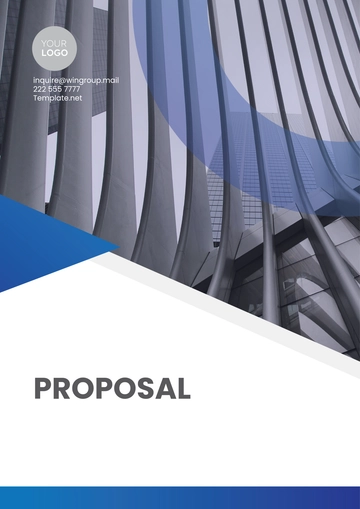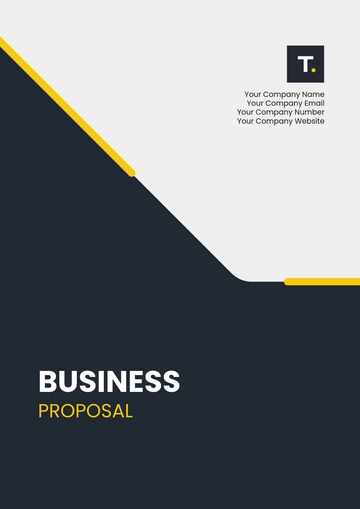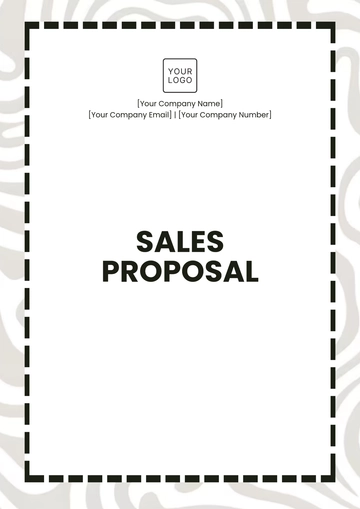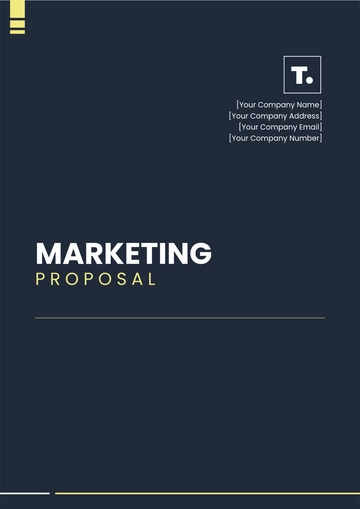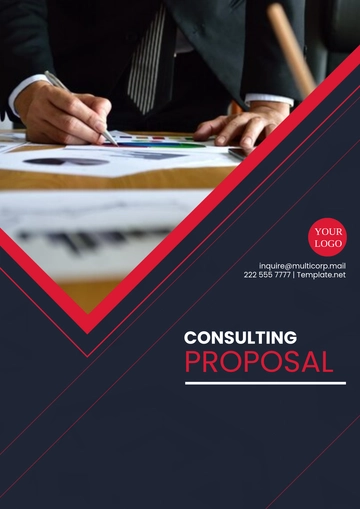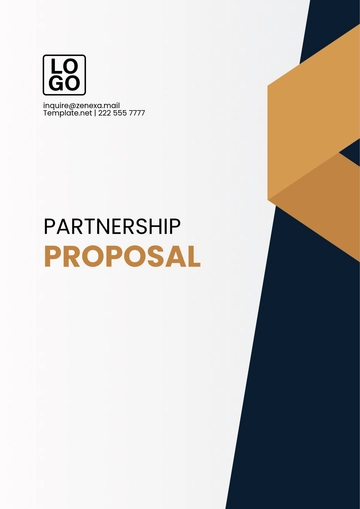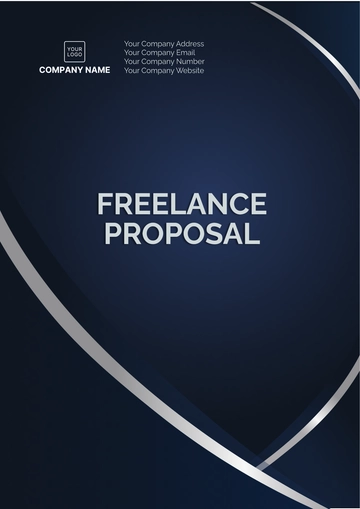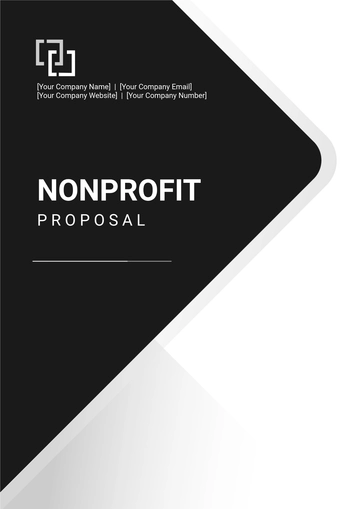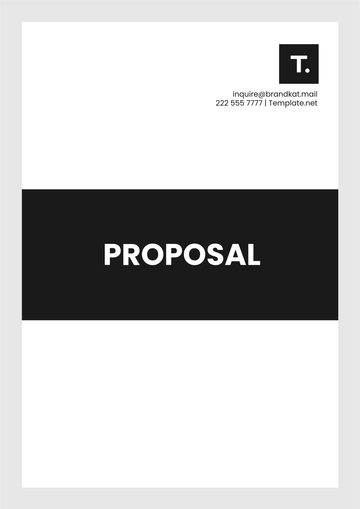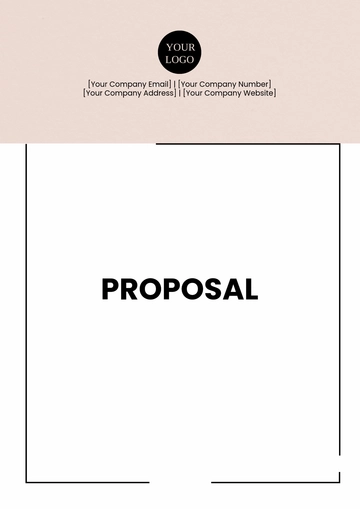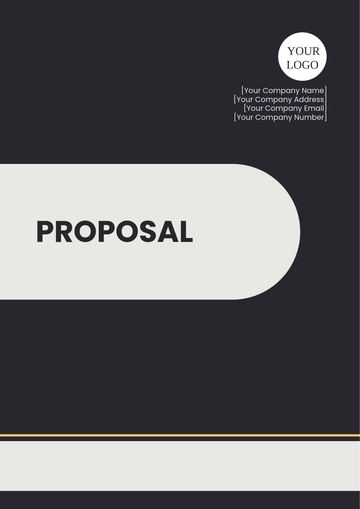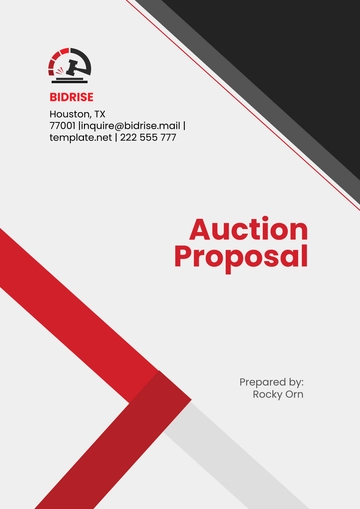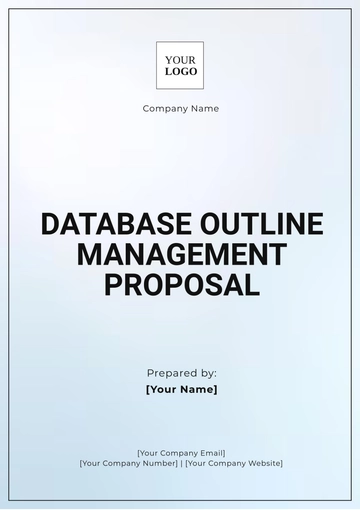Free Auction Proposal
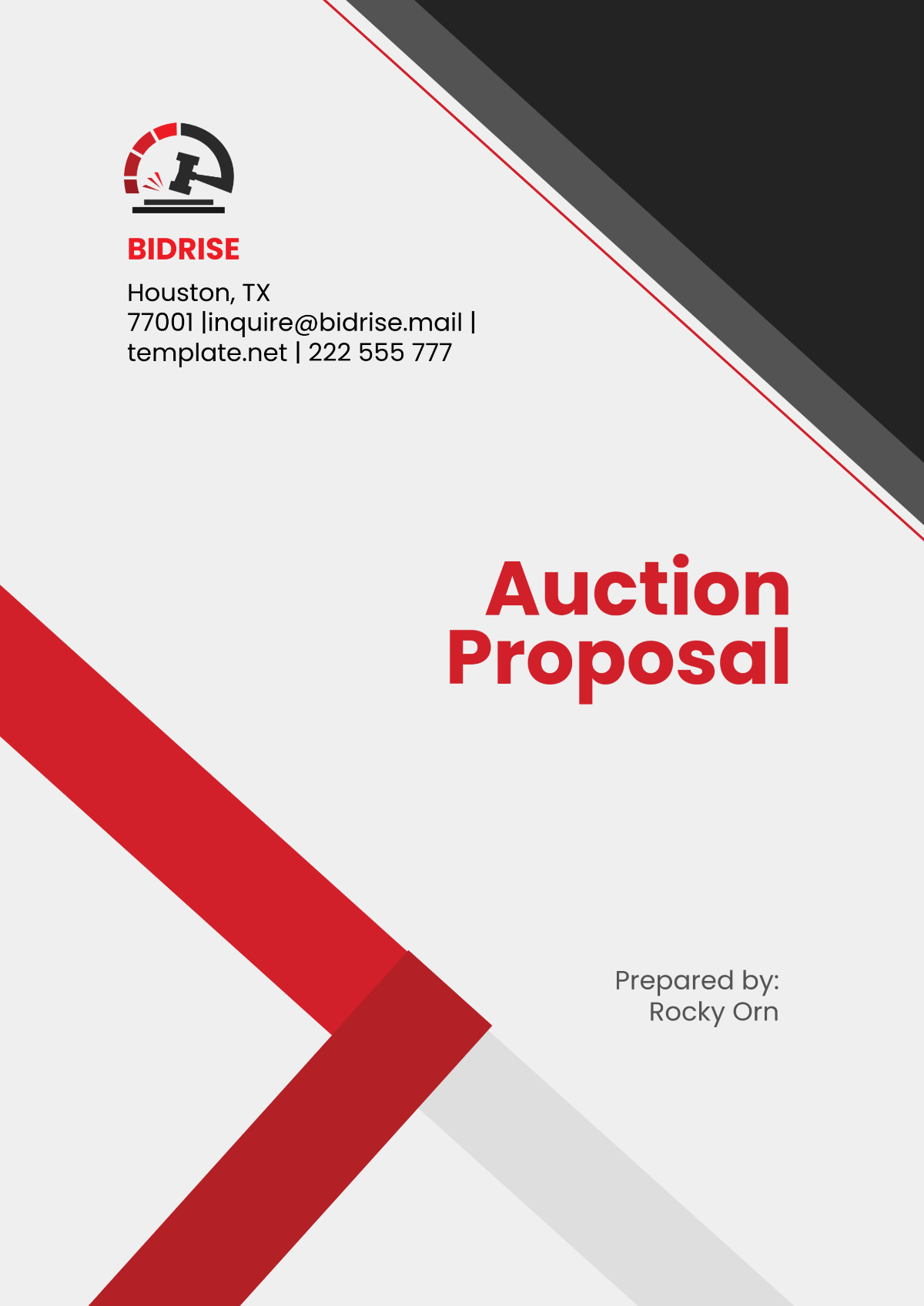
1. Introduction
Businesses must adopt innovative methods to stay ahead and engage customers effectively. To achieve these objectives, [Your Company Name] proposes conducting a strategically designed auction event in [2050], intended to elevate the company's brand visibility, increase revenue, and build stronger relationships with our customers. This auction will provide a unique platform for buyers and sellers to interact in an environment that fosters excitement, competition, and transparency. This proposal outlines the structure, processes, marketing strategies, and financial projections required to execute a successful auction event.
By leveraging the auction format, we intend to offer an exclusive set of products and services, ensuring a memorable experience for participants while meeting our revenue targets and customer engagement goals.
1.1 Purpose
The primary goal of the proposed auction is to create an exciting, competitive platform for buyers to acquire high-value items in a transparent, engaging, and fun setting. The auction is designed to boost sales, raise the profile of our exclusive product categories, and help [Your Company Name] secure both short-term revenue and long-term customer loyalty.
The secondary objective is to establish [Your Company Name] as a leader in adopting modern sales models, breaking away from traditional retail methods and appealing to a younger, more tech-savvy demographic. This will reinforce the company's image as forward-thinking, innovative, and responsive to market trends, while fostering increased interaction between our brand and customers.
The auction will offer unique products, rare collectibles, real estate, luxury goods, and high-end vehicles, aiming to create a high-energy event that attracts both seasoned collectors and first-time bidders.
1.2 Objectives
The key objectives of the auction are as follows:
Increase Revenue: Based on historical data and trends from similar auctions, we anticipate generating an increase in revenue of [20-30]% compared to traditional sales methods. For example, if our previous sales figures totaled $[1,000,000] in product sales, we expect the auction to generate between $[1,200,000] and $[1,300,000].
Enhance Customer Engagement: Auctions are inherently engaging and competitive, and this dynamic will help increase customer interaction. By offering exclusive access to high-demand items, we anticipate a significant boost in user engagement on our website and social media platforms.
Expand Market Reach: The event is expected to attract new customers from diverse geographical locations, particularly international buyers. We plan to target [20]% of participants from regions outside of our primary market, reaching new customers who may not otherwise engage with our products.
Strengthen Brand Identity: Hosting an auction will position [Your Company Name] as a dynamic and adaptable brand that caters to diverse consumer needs, thus differentiating us from competitors and enhancing brand loyalty. Auctions also provide a platform for showcasing our products and services in a new light, ensuring broader brand recognition.
2. Auction Format and Structure
The auction event will follow a well-structured format to ensure transparency, fairness, and excitement. This section outlines the various auction types, categories, and the step-by-step process to guide both participants and organizers.
2.1 Auction Types
[Your Company Name] will offer multiple auction types to cater to a wide variety of participants. Each format will be tailored to the specific products or services on offer:
Live Auction: This will be the central attraction, where bidders will place bids in real-time during a live event. A professional auctioneer will lead the session, creating an energetic atmosphere and encouraging competitive bidding. This format will primarily feature rare and high-value items, including luxury cars, fine art, and real estate.
Silent Auction: In this type of auction, bidders can place their bids discreetly on paper or via an online platform. Silent auctions typically have lower-stakes items, such as electronics or collectibles. This format encourages participation without the intensity of real-time bidding.
Online Auction: An entirely digital auction, conducted on our website or a third-party platform, will allow bidders to place their bids remotely. This model is well-suited to customers who may not be able to attend the live event but still wish to participate. Online auctions will feature more accessible, everyday products like gadgets, technology, and smaller luxury goods.
Timed Auction: This auction will run for a fixed period (e.g., 48 hours) and bidders can place their bids within that time frame. Timed auctions offer greater flexibility for both sellers and buyers, as they are not bound by a specific time for real-time bidding.
2.2 Auction Categories
To cater to a diverse audience, [Your Company Name] will offer a wide variety of auction categories. These categories are designed to appeal to different buyer segments, from collectors of fine art to those interested in purchasing investment properties.
Category | Description | Estimated Value Range | Example Items |
|---|---|---|---|
Collectibles | Rare items such as antiques, fine art, and vintage memorabilia. | $500 - $50,000 | Limited-edition artwork, historical artifacts |
Real Estate | Commercial and residential properties with high growth potential. | $100,000 - $5,000,000 | Luxury apartments, land parcels, investment properties |
Vehicles | Luxury cars, rare motorcycles, boats, and vintage automobiles. | $10,000 - $2,000,000 | Ferrari, Lamborghini, vintage motorcycles |
Technology & Gadgets | High-end electronics, including the latest gadgets and cutting-edge technology. | $100 - $10,000 | Smartphones, laptops, home automation devices |
Luxury Goods | Designer apparel, fine jewelry, and other high-end fashion accessories. | $500 - $100,000 | Rolex watches, diamond necklaces, designer handbags |
2.3 Auction Process
The auction process will be carefully managed to ensure fairness, efficiency, and a positive experience for both sellers and buyers. The process will include the following steps:
Registration: Participants will be required to register online before the auction, providing details such as name, contact information, and financial verification to ensure they are qualified bidders. Registration will open [1] month prior to the auction.
Item Preview: Before the auction begins, participants will have the opportunity to view the auction items either online through detailed images and descriptions or in person at the event venue. This will help bidders make informed decisions.
Bidding: The auction will officially begin with the auctioneer announcing each item for bid. Bidders will be able to raise their paddle or submit bids via an online platform for live and silent auctions. In the case of online auctions, participants will bid directly through our website.
Winning Bid: The highest bid placed before the close of each auction item will be declared the winner. The auctioneer will officially close the bidding for each item, and payment will be processed immediately.
Post-Auction Process: After the auction concludes, the winning bidders will receive an invoice with payment instructions. We will offer multiple payment methods, including credit cards, bank transfers, and digital wallets. Successful payments will trigger item shipping or delivery arrangements.
3. Marketing and Promotion
For the auction event to succeed, it is crucial that [Your Company Name] employs a comprehensive marketing strategy to generate excitement and attract bidders. The following marketing channels will be used to promote the auction:
3.1 Marketing Channels
The event will be promoted through a multi-channel marketing approach, ensuring we reach the widest possible audience:
Social Media Campaigns: We will utilize Facebook, Instagram, Twitter, and LinkedIn to target both new and existing customers with engaging posts, videos, and countdowns. Each platform will serve a specific purpose—Instagram will highlight visually stunning items, while LinkedIn will target professional buyers and investors.
Email Marketing: A series of email newsletters will be sent out to registered customers and potential bidders. These emails will provide early bird previews, auction details, and reminders, encouraging participation.
Influencer Partnerships: We will partner with influencers from various industries, including real estate, luxury cars, and fashion. Influencers will generate excitement and buzz for the auction through sponsored content, live previews, and behind-the-scenes looks at exclusive items.
Press Releases & Media Coverage: Press releases will be distributed to major media outlets to announce the auction event. Media coverage in newspapers, magazines, and online publications will help build awareness.
Paid Advertising: We will use Google Ads and display advertisements on social media platforms to target specific keywords and users who are likely to engage in the auction. Targeted ads will appear across relevant websites, boosting traffic to our auction page.
3.2 Marketing Timeline
A clear timeline will guide the marketing campaign for the auction:
Phase | Timeframe | Action |
|---|---|---|
Phase 1 - Teaser | 3 months before | Social media teasers, save-the-date posts, influencer content. |
Phase 2 - Awareness | 2 months before | Email newsletters, press releases, targeted paid ads. |
Phase 3 - Engagement | 1 month before | Interactive countdowns, behind-the-scenes content, interviews. |
Phase 4 - Final Push | 1 week before | Last-minute email reminders, last-chance offers, live sessions. |
3.3 Budget Allocation
A robust marketing budget is necessary to effectively promote the auction and drive engagement. Below is the breakdown of the marketing budget:
Marketing Channel | Budget Allocation |
|---|---|
Social Media Campaigns | $15,000 |
Email Marketing | $7,500 |
Influencer Partnerships | $25,000 |
Press Releases & Media Coverage | $10,000 |
Paid Advertising | $15,000 |
Miscellaneous Costs | $5,000 |
Total | $77,500 |
4. Auction Logistics and Operations
To ensure smooth operations, [Your Company Name] will implement a well-organized structure for managing all aspects of the auction event, from venue preparation to post-auction activities.
4.1 Venue and Setup
The auction will be hosted at an upscale venue capable of accommodating both live bidders and virtual participants. The venue will be equipped with state-of-the-art technology to ensure seamless video streaming for online participants and high-quality audio for live attendees.
Venue Feature | Requirement |
|---|---|
Space Capacity | 500 to 1000 people |
Lighting | Professional stage lighting |
Audio/Visual Equipment | Projectors, microphones, screens |
Security | 24-hour surveillance, on-site security |
Parking | Ample space for attendees |
4.2 Staffing Requirements
A dedicated team of professionals will be required to facilitate the auction:
Role | Number of Staff |
|---|---|
Auctioneer | 1 |
Event Coordinators | 5 |
Security Personnel | 12 |
Technicians | 6 |
Customer Support | 7 |
Marketing & PR Team | 5 |
4.3 Payment and Transaction Handling
Multiple payment methods will be offered to ensure the convenience of all bidders. We will employ secure, encrypted transaction processing platforms to ensure payment data is safe and reliable.
Payment Method | Fee Percentage |
|---|---|
Credit Card Payments | 2% |
Bank Transfers | $10 flat fee |
Digital Wallets | 1% |
4.4 Item Delivery and Logistics
The delivery of auction items will be managed by [Your Company Name], with an option for bidders to either pick up their items or have them delivered. Large items such as real estate and vehicles will require private, secure delivery services, while smaller items will be shipped using standard courier services.
5. Budget and Financial Projections
The total cost for executing the auction event will be carefully managed to ensure maximum profitability. Below is a detailed budget breakdown, along with projected revenue.
5.1 Budget Breakdown
Category | Estimated Cost |
|---|---|
Venue & Setup | $30,000 |
Staff & Personnel | $40,000 |
Marketing | $77,500 |
Payment Processing | $7,500 |
Security & Logistics | $18,000 |
Miscellaneous Costs | $10,000 |
Total | $183,000 |
5.2 Revenue Projections
The projected revenue from the auction will depend on several factors, including the number of participants, the types of items offered, and the final bid amounts. Based on a conservative estimate, we expect the following revenue:
Auction Category | Estimated Revenue |
|---|---|
Collectibles | $250,000 |
Real Estate | $6,500,000 |
Vehicles | $1,200,000 |
Technology & Gadgets | $500,000 |
Luxury Goods | $800,000 |
Total Revenue | $9,750,000 |
6. Risk Management and Contingency Planning
While the auction event holds significant potential for success, it is crucial to consider and plan for potential risks. Proper risk management will allow [Your Company Name] to address any unexpected challenges quickly and effectively. Below are some of the key risks associated with the event, along with proposed mitigation strategies.
6.1 Potential Risks
Low Bidding Activity: One of the most significant risks in any auction is the possibility of low participation or a lack of competitive bidding, which could result in lower-than-expected revenue. To mitigate this risk, we will conduct pre-event market research to gauge interest in specific items and ensure that only desirable, high-value products are included in the auction. Additionally, targeted marketing campaigns will be designed to generate excitement and attract a larger audience of qualified bidders.
Technical Failures: Given that we are hosting both live and online auctions, any technical failure—whether it's a streaming error, a platform crash, or payment processing issues—could disrupt the event and result in poor customer satisfaction. To address this, we will work closely with professional event planners and technical experts to conduct rigorous testing before the event. Backup systems for streaming, payment processing, and website functionality will be in place to ensure a seamless experience for bidders.
Logistical Challenges: The delivery of auctioned items, particularly high-value products such as real estate, luxury vehicles, and fine art, requires careful logistical coordination. A failure to meet delivery timelines or ensure proper handling could lead to customer dissatisfaction. To mitigate this, we will work with experienced logistics partners with proven track records. A detailed delivery schedule will be established in advance, and communication with bidders will be maintained at every step to keep them informed about the status of their items.
Security Threats: Auctions, especially those involving high-value items, can attract security risks, including fraud, theft, or scams. [Your Company Name] will take every precaution to protect both participants and their financial information. On-site security personnel will be assigned to monitor the event, and a secure online payment gateway will be used to handle all transactions. Fraudulent activity will be flagged immediately, and appropriate legal action will be taken if necessary.
Economic Downturns: The broader economic environment can affect consumer spending, particularly on luxury items and high-value goods. To address this risk, we will monitor market conditions in advance and adjust the auction lineup accordingly. If needed, we will increase the appeal of more accessible products to ensure that there are auction items available for bidders with different budgets.
6.2 Contingency Planning
A detailed contingency plan will be developed to handle any potential issues that arise during the auction. The key components of this plan will include:
Backup Bidders: In case of low bidding activity, we will maintain a list of backup bidders who are pre-registered and ready to step in and bid on selected items. This will help stimulate bidding and ensure that each item finds a buyer at the right price.
Technical Support Team: A dedicated team of IT professionals will be available throughout the event to address any technical issues immediately. This will include troubleshooting live streaming issues, resolving platform glitches, and ensuring that the payment processing system runs smoothly. The team will also be on standby to monitor the auction website for any unexpected downtime.
Emergency Logistics Partners: In case of any issues with our primary logistics partners, we will have a secondary network of reliable couriers and transport companies to step in and handle the delivery of auction items. These partners will be pre-briefed on the specific needs of the auction and ready to handle urgent situations with short notice.
Legal Safeguards: Contracts with buyers and sellers will be carefully drafted, ensuring that both parties are legally protected. This will include terms for returns, delivery, and dispute resolution. Additionally, in the case of fraudulent bids or payments, legal recourse will be available to protect the interests of [Your Company Name] and the integrity of the auction.
7. Post-Auction Evaluation
After the auction has concluded, it is essential to evaluate the event's overall success. The post-auction analysis will help [Your Company Name] identify areas for improvement and adjust strategies for future auctions. Key performance indicators (KPIs) will be tracked, and feedback from participants will be gathered.
7.1 Key Performance Indicators (KPIs)
Several KPIs will be measured to assess the success of the auction:
Revenue Generation: One of the most critical KPIs will be the total revenue generated through the auction. We aim to exceed our initial projections of $[9,750,000], and detailed financial analysis will help determine how well the auction performed relative to expectations.
Bidder Participation: The number of registered bidders and active participants will be tracked. We aim for at least [2,000] registered bidders, with a participation rate of around [50-60]% of those registered.
Customer Satisfaction: Feedback from bidders will be gathered through post-event surveys and direct communication. We will assess their satisfaction with the bidding process, item descriptions, event logistics, and post-auction delivery. A goal of [80]% positive feedback will be targeted.
Marketing Effectiveness: The success of our marketing campaign will be evaluated by measuring the return on investment (ROI) of our promotional efforts. This will include analyzing website traffic, social media engagement, email open rates, and conversions (i.e., participants who place bids). We expect to see at least a [25-30]% increase in engagement compared to previous marketing campaigns.
7.2 Customer Feedback and Insights
Post-auction surveys will be sent to both winners and non-winners to gather detailed feedback about their experiences. The surveys will ask questions about:
Ease of Registration: Was the registration process clear and simple?
Auction Experience: Was the bidding process straightforward, and were all instructions clear?
Event Organization: Were the event logistics, including item previews, check-in, and payment processing, well-organized?
Item Delivery: Were the delivery timelines met, and was the delivery process smooth?
The results from these surveys will inform future auction events and ensure that [Your Company Name] continues to meet customer expectations.
8. Future Considerations and Opportunities
While the proposed auction for [2050] is expected to be highly successful, there are several future opportunities that can be explored to grow and evolve our auction model.
8.1 Expansion of Auction Categories
In future auctions, [Your Company Name] may expand the product categories to include additional niche items. For example, we could explore:
Technology Innovations: Auctions of emerging technologies such as artificial intelligence, robotics, and space exploration gear.
Experience-Based Auctions: Unique travel packages, VIP events, and once-in-a-lifetime experiences such as private concerts or exclusive dinners with industry leaders.
8.2 Global Expansion
As our auctions gain popularity and recognition, there may be opportunities to expand the reach of the event to international markets. By partnering with local businesses and auction platforms, [Your Company Name] can host global auctions, tapping into new customer bases in regions such as Europe, Asia, and the Middle East.
8.3 Partnership with Charities
Another avenue for expansion is to integrate a charity aspect into our auctions. Certain items could be designated as "charity lots," where a portion of the auction proceeds goes to a charitable cause. This would not only help increase the appeal of the auction but also position [Your Company Name] as a socially responsible brand.
8.4 Auction Series
Rather than hosting a single auction event, we could consider hosting a series of auctions throughout the year, each focusing on different themes or product categories. These could be held online or in various cities to cater to regional buyers and build ongoing anticipation.
9. Conclusion
The proposed auction event offers [Your Company Name] a powerful opportunity to boost revenue, engage customers, and establish itself as a forward-thinking leader in the market. By executing a well-planned auction strategy, with a comprehensive marketing campaign, well-organized logistics, and clear risk management protocols, the event is poised for significant success. With the insights gained from this auction, [Your Company Name] can continue to refine its approach to future events, positioning the company for sustained growth and innovation.
Through this auction, we aim to redefine how luxury and high-demand items are marketed and sold, creating lasting relationships with customers, generating significant profits, and elevating [Your Company Name] as a key player in the modern marketplace. The investment in this event will pay off through increased brand recognition, customer loyalty, and ongoing business opportunities in the years to come.
- 100% Customizable, free editor
- Access 1 Million+ Templates, photo’s & graphics
- Download or share as a template
- Click and replace photos, graphics, text, backgrounds
- Resize, crop, AI write & more
- Access advanced editor
Present compelling proposals for auctions using the Auction Proposal Template from Template.net. This editable and customizable template simplifies creating professional and persuasive documents. Adjust it seamlessly with the AI Editor Tool.
You may also like
- Business Proposal
- Research Proposal
- Proposal Request
- Project Proposal
- Grant Proposal
- Photography Proposal
- Job Proposal
- Budget Proposal
- Marketing Proposal
- Branding Proposal
- Advertising Proposal
- Sales Proposal
- Startup Proposal
- Event Proposal
- Creative Proposal
- Restaurant Proposal
- Blank Proposal
- One Page Proposal
- Proposal Report
- IT Proposal
- Non Profit Proposal
- Training Proposal
- Construction Proposal
- School Proposal
- Cleaning Proposal
- Contract Proposal
- HR Proposal
- Travel Agency Proposal
- Small Business Proposal
- Investment Proposal
- Bid Proposal
- Retail Business Proposal
- Sponsorship Proposal
- Academic Proposal
- Partnership Proposal
- Work Proposal
- Agency Proposal
- University Proposal
- Accounting Proposal
- Real Estate Proposal
- Hotel Proposal
- Product Proposal
- Advertising Agency Proposal
- Development Proposal
- Loan Proposal
- Website Proposal
- Nursing Home Proposal
- Financial Proposal
- Salon Proposal
- Freelancer Proposal
- Funding Proposal
- Work from Home Proposal
- Company Proposal
- Consulting Proposal
- Educational Proposal
- Construction Bid Proposal
- Interior Design Proposal
- New Product Proposal
- Sports Proposal
- Corporate Proposal
- Food Proposal
- Property Proposal
- Maintenance Proposal
- Purchase Proposal
- Rental Proposal
- Recruitment Proposal
- Social Media Proposal
- Travel Proposal
- Trip Proposal
- Software Proposal
- Conference Proposal
- Graphic Design Proposal
- Law Firm Proposal
- Medical Proposal
- Music Proposal
- Pricing Proposal
- SEO Proposal
- Strategy Proposal
- Technical Proposal
- Coaching Proposal
- Ecommerce Proposal
- Fundraising Proposal
- Landscaping Proposal
- Charity Proposal
- Contractor Proposal
- Exhibition Proposal
- Art Proposal
- Mobile Proposal
- Equipment Proposal
- Student Proposal
- Engineering Proposal
- Business Proposal
